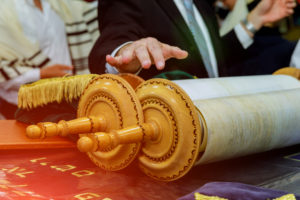
By Rabbi Joe Hample
Parshat Devarim
I’m grateful to have a fairly normal summer after the loneliness and boredom of a lockdown year. Coming up: face-to-face office hours! Face-to-face religious school! Face-to-face adult ed! Face-to-face life cycle events! Face-to-face High Holidays! Woo-hoo!
And yet this won’t be a normal season at all. Pandemic or no, the chaos and violence over the last 12 months, in the U.S. and in the land of Israel, preclude any full return to familiar patterns. Security will be tighter; attitudes will be warier. The strains and sorrows of the coronavirus helped unleash the year’s craziness, but the damage done will outlast the medical crisis.
In this week’s Torah portion, we are finally at the brink of the Promised Land after a 40-year delay and much loss of life (Deuteronomy 1:1-8). Moses reviews bonds broken and lessons learned (Deuteronomy 1:9-18). How easy to sulk and snivel, to wallow in self-pity, to blame our troubles on someone else (Deuteronomy 1:26-28) — but that won’t move us forward. The tension is palpable.
We still feel that tension. We American Jews are rousing from a grand reverie, an epic illusion that we are part of the mainstream population. In spite of our contributions to American art and science, American business and politics, we are not part of the mainstream population. We are “other”: We are a minority upon whom the majority projects its fears and foibles, its vices and vanities. It’s a rude awakening.
Suddenly and incredibly, we Jews are again the target of dark rumors, conspiracy theories and acts of violence, like our ancestors throughout history. The synagogue shooting of October 2018 was no fluke, much as we wish it were. Demonized in different ways by right and left, we have less and less control of our own image, our own definition. What does that bode for our future?
In this week’s haftarah, in the Jerusalem of the eighth century BCE, we confront the menace of a rising, ruthless Assyria. “Come let us reason together,” says God reassuringly (Isaiah 1:18), but how often we have betrayed this God on whose protection we now depend! Are we too late to reclaim an unaccustomed piety, a half-forgotten faith? What words, what holy acts will mend the threadbare covenant in time to rescue us? Danger hangs in the air.
The danger persists. We Zionists — I trust most of us are Zionists — are stirring from a sweet daydream, a fond fantasy that the world supports a Jewish state, after all it has put us through. In spite of Israel’s contributions to culture and scholarship, medicine and technology, the world does not support a Jewish state. In the world’s eyes, 200 other peoples around the globe deserve a state — the Slovaks and the Slovenes, the South Sudanese and the East Timorese deserve a state — but the Jews, not so much.
How did we get here? Yes, the Palestinians have suffered; and no, it isn’t the Palestinians’ fault if the Jews were persecuted in Germany or Russia. Israel has made mistakes, and worse abuses in other countries are beside the point. But how is it possible that one Jewish state is too many and 18 Arab states are not enough? I realize we Jews are a small people, but surely we are 1/18 as important as the Arabs.
The Jew worships an invisible God: a short-term embarrassment and a long-term advantage. I’m square — I believe in the God of the Bible, but I respect other views. For my agnostic friends: God is a metaphor for our search for meaning. For my existentialist friends: By changing for God, we make God real. In any case, a Jew should never say “everyone does it”: a Jew is called to be different from “everyone,” a light unto the nations (Isaiah 49:6). We dare not stoop to the level of our adversaries — that would legitimate their tactics. If your enemy hungers, give them bread; if your enemy thirsts, give them water (Proverbs 25:21).
On July 18 — Tisha b’Av, the Temple Fast — we pivot from admonition to consolation, as we begin the seven weeks of coming home to God for the High Holidays. Jewry’s position in America, Israel’s reputation in the world, is shakier than ever before in my lifetime. So be it, provided we renew our ties with the true judge, the one impartial observer of us all.
The world lurches from fad to folly, hokum to hypocrisy. But “Zion shall be saved by justice, her returnees by righteousness” (Isaiah 1:27). l
Rabbi Joe Hample is the spiritual leader of the Tree of Life Congregation in Morgantown, West Virginia. This column was originally provided to the Pittsburgh Jewish Chronicle as a service of the Greater Pittsburgh Rabbinic Association.





